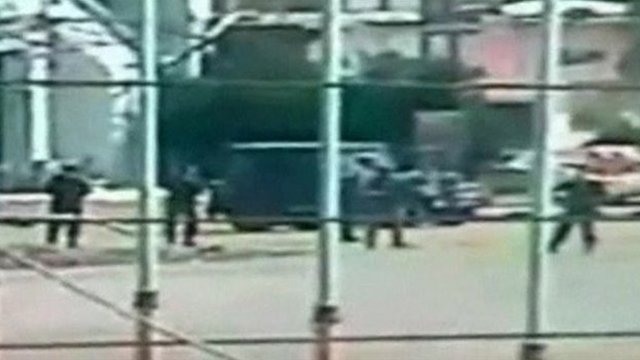 The army has seized control of a mosque which had become a centre for anti-government protests in the southern Syrian city of Deraa, witnesses say.
The army has seized control of a mosque which had become a centre for anti-government protests in the southern Syrian city of Deraa, witnesses say.
Soldiers are now stationed on the roof of the Omari mosque in the city centre, after an assault supported by tanks.
Activists said six people had been killed in the city. On Friday, they reported at least 66 protester deaths in Syria, most of them in Deraa.
Officials said the number of dead was far lower, and included four soldiers.
State television said security forces had come under attack by "armed terrorists" in Deraa and Homs, Syria's third city.
In other developments on Saturday:
Activists said 138 members of the ruling Baath Party in the southern Hawran region, in which Deraa is located, resigned on Saturday in protest against the crackdown
Security forces reportedly arrested two veteran opposition figures - Hassan Abdul Azim, 81, was detained in Damascus, while 85-year-old Omar Qashash was arrested in Aleppo, according to the Syrian Centre for the Defence of Prisoners of Conscious
Eleven women were arrested in the al-Salihiya district of Damascus after they took part in a silent all-female demonstration in support of the residents of Deraa, activists said
UK Foreign Secretary William Hague voiced alarm at the reports of hundreds of deaths, saying: "The Syrian government has failed to heed repeated calls by the international community for restraint."
'Operations intensifying'
Foreign journalists are not being allowed into the country, and the exact picture of what is happening remains unclear.
However, residents of Deraa said the assault on the historic Omari mosque involved troops backed by tanks and heavy gunfire. It took about 90 minutes for the army to gain control, they added.
"The shelling has stopped. There are snipers on the roof of the mosque," one man told the Reuters news agency, adding that forces appeared to be in control of the city's old quarter for the first time.
Earlier, another resident, Abu Ahmed, said: "It looks like [the security forces] want to finish their campaign today. From the new tank deployments, it looks as though they are intensifying their operations."
The Omari mosque has been a focus of the protests in Deraa since mid-March.
People frequently gathered there to demand political freedom and, more recently, the end of President Bashar al-Assad's rule.
Human rights activists said at least at least six people had been killed on Saturday. One said they had been shot by snipers.
Activists said some 40 people were killed in Deraa on Friday.
With no-one allowed to hold funerals in the city - even going out to pray has been banned - bodies are being stored in makeshift morgues. Unverified video footage showed fully-clothed bodies piled inside a large vegetable freezer.
'Breaking the siege'
The authorities have told relatives of those killed in other parts of Syria to keep the funerals small and personal.
In the past that has not prevented sympathisers turning out and chanting slogans against the regime, says the BBC's Jim Muir in Beirut.
Websites supporting the uprising in Syria have said the bloodshed will only increase the resolve of the protesters to see through the mission of those who have fallen, our correspondent says.
They have called for a "week of breaking the siege" - a reference to the dire situation in Deraa, which has been in the grip of a crackdown by troops and tanks for the past six days, he adds.
They are planning demonstrations in different parts of the country everyday, culminating in nationwide protests at the end of the week.
Deraa has been without electricity, water and telephone lines since Monday.
Unconfirmed reports said some soldiers had deserted and were seeking refuge with locals after refusing to fire on protesters in Deraa.
The Syrian human rights group, Sawasiah, says at least 560 people have been killed nationwide since protests began on 15 March.
President Assad's government blames extremists for the unrest, which it says have left nearly 80 security personnel dead.



